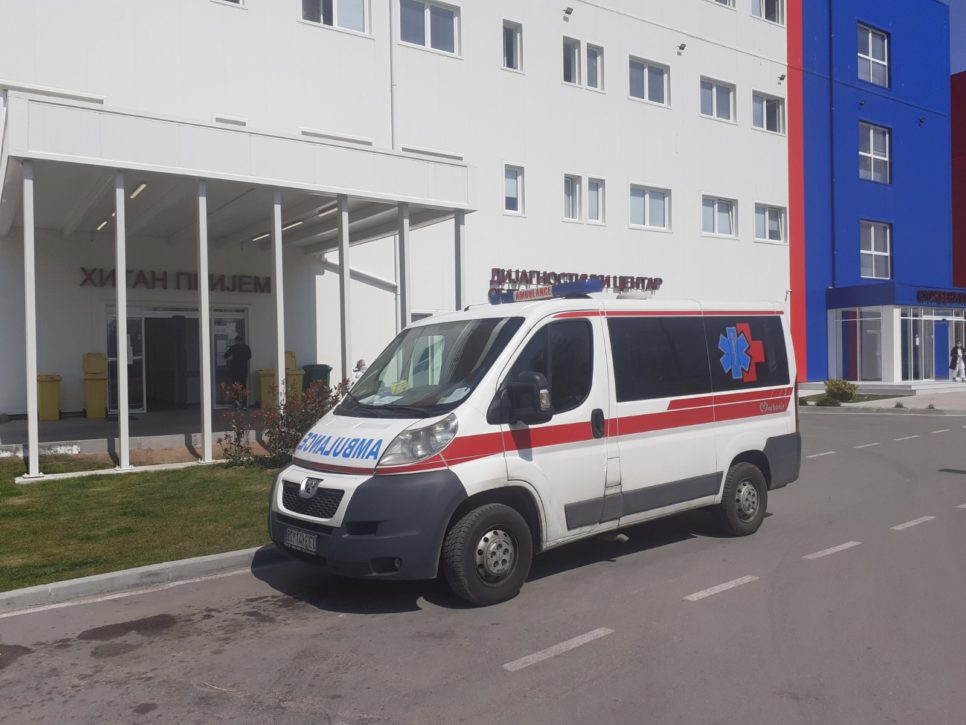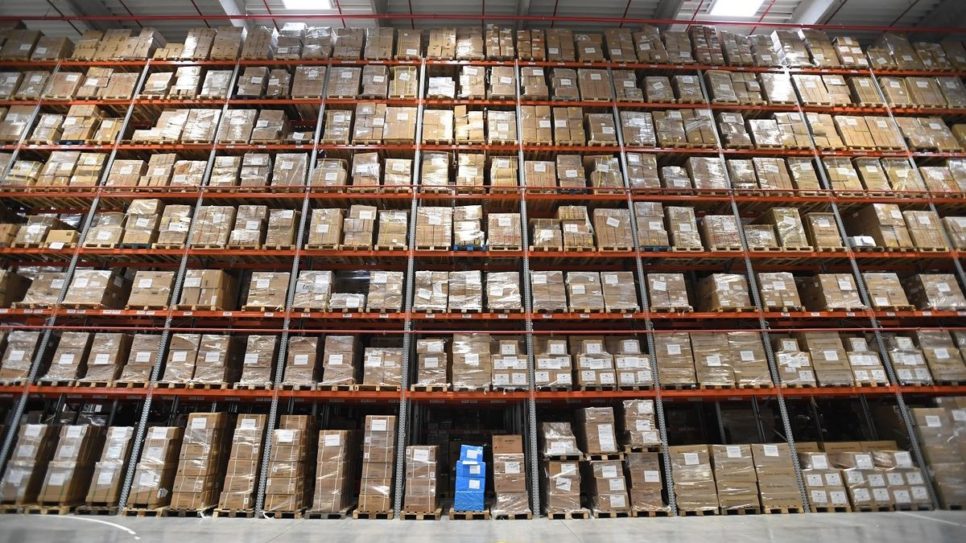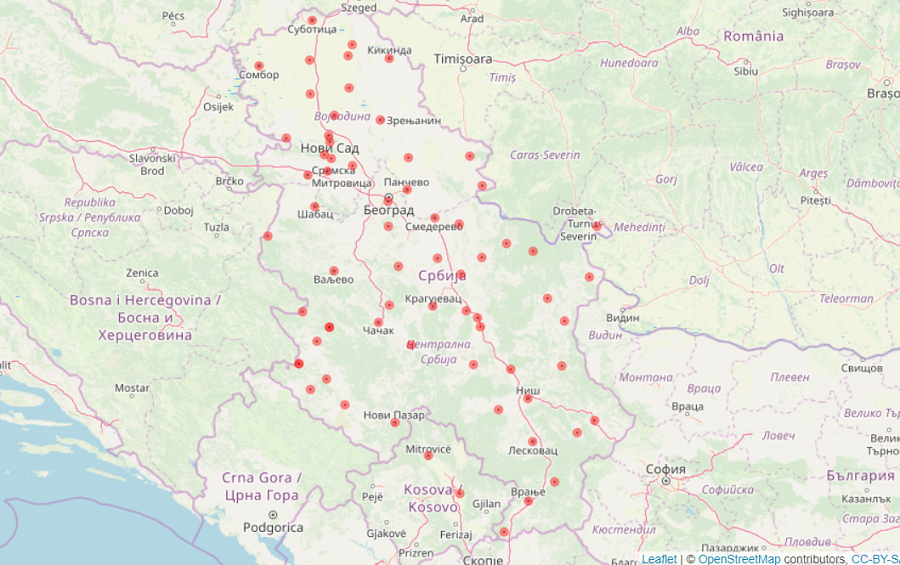Since the coronavirus pandemic started, Zvonimir Đorđević has left Belgrade and isolated himself on Mt. Zlatibor. The reason for the relocation is his illness.
“My doctors say that if I get COVID, I won’t last more than three days.”
Zvonimir has diabetes, which he has been battling for more than 35 years. His daily routine includes numerous drugs and supplements, he explained in an interview with the Center for Investigative Journalism of Serbia (CINS).
Official estimates say that there are at least 770,000 people with diabetes in Serbia, and this disease was the fifth leading cause of death in 2019.
Psychologist Dunja Božović, an associate of the Diabetes Association of Serbia, said that most people found it difficult to accept the fact that a diabetes therapy was life-long, because there is no cure. Out of desperation, they may resort to alternative therapeutic methods, like tea.
“Guided by fear, they resort to something they believe is more natural and not as invasive, that it cannot hurt. They think that (an anti-diabetic) tea might not help them, but certainly won’t harm them.”
About two years ago, Zvonimir, too, came across a product advertised as a solution for diabetes, a tea called Diabetin. He ordered two boxes, but they did not help. He told CINS he did not remember how much he had paid for them, but after that he no longer ordered products not approved by his doctors.
CINS’ research shows that this tea is sold on several websites in Serbia, without the approval of health institutions – and it goes so far as to promise curing diabetes, a disease for which there is no cure yet. Believing the false hope they are offered, in this way buyers potentially endanger their already compromised health. Given that it is not registered as a drug, no one is monitoring its use.
Bojana Marković of the Belgrade Association of Persons with Diabetes Blue Circle told CINS that if someone who was suffering from diabetes did not apply their therapeutic regimen, but rather took something that someone who was not a doctor had recommended them, the consequences could be devastating.
“You could lose your eyesight, go on dialysis, have problems with your blood vessels, blood pressure, lose a foot… serious problems can occur.”
Marković said that people should consult their doctor before using anything.
Dr. Tijana Dangubić also thinks it is important to apply an approved treatment. According to her, there have been cases of patients with diabetes stopping their medication and coming to the doctor with very high blood sugar levels and ketoacidosis.
“It is a very dangerous metabolic state that can lead to a coma and death.”
A diabetes drug and a wheel of fortune that always stops in the same place
On the website and in the media that advertise this product, there are articles with clickable headlines which allegedly uncover a conspiracy. For example, it is “revealed” that Serbian pharmaceutical magnates are hiding a solution for type 2 diabetes, and that Serbian pharmacy chains do not want to sell Diabetin because they are money hungry and do not care about patients with diabetes.
All the links on the page lead to a wheel of fortune that offers a lucky winner of some kind of lottery a 50% discount “on that day only.” Nevertheless, one can become a lucky winner even if they go back to the website the next day, or the day after that, or in fact any day. All they need to do is leave their telephone number and name, so that someone can contact them.
That is why we decided to see how ordering works.
Not long after the CINS journalist introduced herself as someone interested in the tea, an unidentified girl contacted her, explaining that Diabetin was used to regulate diabetes. She confirmed to the journalist during the conversation that the tea would cure diabetes, like it says on the website.
“It can replace any tablet or insulin instantly, but it is not done that way. The use of insulin or tablets is always reduced. So, it is reduced until they are eliminated.”
She also explained that it took less time to cure “new” patients with diabetes, whereas those who had been suffering from diabetes for years required more time.
In the process of ordering the tea, the journalist was not asked whether she had diabetes, what kind of medications she was taking or whether she suffered from any other diseases. The only required proof is a pension certificate, in case a person wanted the more affordable “pensioners’ package.”
All this is also extremely expensive because one box containing a bag of Diabetin tea costs about 2,300 dinars, and if a patient is already using insulin they should use as much as a half of the bag every day. So for, say, a month of everyday use, a person would have to spend around 35,000 dinars.

According to Radomir Ćirilović, the president of the Novi Sad-based Consumer Rights Protection Association Prosperitet, the competent inspectorate must react if someone is deceiving buyers.
If there is a claim on the Internet or if someone is told over the telephone that the tea will help them cure diabetes, they can contact the market inspectorate because the vendor had misled them.
Ćirilović believes that should be a criminal offense, because people’s health is jeopardized in that way. A number of people have complained to Prosperitet about having fallen for the sale of similar teas, including Diabetin itself, he added.
“Nobel Prize winner” from Bajmok
Diabetin is otherwise advertised as a diabetes medicine created on the grounds of the work of Nobel Prize winner Mikhail Alferov. However, there is no Nobel Prize winner with this first and last name, while the photograph of the alleged scientist is a generic one taken from the Internet.
The truth is that the tea is sold by the Laboraks company, owned by one Vanja Maravić. Until the end of August 2020 the company had been registered in Bajmok, near Subotica, whereas now it is at the address of a house in Boleč, a quarter in Belgrade’s municipality of Grocka, which CINS journalists visited. On the ground floor of the rented house, they found a Laboraks female employee, who declined to speak for CINS.
People living in Boleč said that they knew teas were sold “somewhere around there,” but did not know more than that. A local pharmacy does not sell Diabetin tea because, as the staff put it, they do not sell products that have not been approved.

Diabetes drug is fake news
Teas in Serbia may be registered as drugs or as dietary products. That depends, among other things, on their ingredients. If it is registered as a drug, a tea can be found in the official database of the Medicines and Medical Devices Agency of Serbia (ALIMS), and as a dietary product in the register of the Ministry of Health.
Medications cannot be sold online, nor can they be advertised without permission from a competent institution. There are also special rules for advertising in the media. For example, permission from ALIMS is always required, while advertising diabetes drugs is actually prohibited.
A “cure” also found in the region
In addition to the wheel of fortune, the article promoting Diabetin also includes the testimonies of satisfied users, which, like the rest of the website, are fake. These are some of the mechanisms that are used in online scams, showed an analysis conducted by FakeNews Tragač.
Nearly identical websites exist in Montenegro and Bosnia and Herzegovina, too.
They sell products under different names, but with a similar purpose. Instead of Diabetin, websites in the region advertise Glucosine which, according to their claims, cures diabetes. The tea is also available in Serbia, but has not been approved.
The company behind this tea is Nutra Aktiv, which has offices in all three countries. The owner of the company in Serbia is Bosnian national Haris Mustajbašić, while behind the Montenegrin company is another firm registered in Cyprus, and so real ownership is hidden.
Unlike many websites that claim this to be a drug, the Nutra Aktiv website says it is a product that “helps treatment.”
“Our website is nutraaktiv.com, what is found on that website is the information we stand behind,” said Mustajbašić.
He explained to CINS that Glucosine tea could not replace medical treatment, i.e. it could not cure diabetes, rather it could help. He also distanced himself from the other websites.
However, Diabetin is not registered either as a drug or as a dietary product. That put it in the gray zone and it was advertised on specialized websites, but also in the media.
In May 2020, Happy TV’s website carried an article advertising Diabetin, which was also documented by the journalists at FakeNews Tragač, who “hunt down” fake news. However, after that the article was also published by the Espreso website, owned by Igor Žeželj’s Adria Media Group.
The article’s headline asks why the solution for diabetes is kept secret and indicates the possibility that hundreds of thousands of people are taking the “wrong” tablets. On the day this article was published, Espreso was among the more popular journalism portals in Serbia, with close to 480,000 visitors.
Such articles pose a great danger to citizens and manipulate people, said the president of the Independent Journalists’ Association of Serbia (IJAS), Željko Bodrožić:
“Sick people see a way out and a chance for healing in everything and it should not be held against them that they are trying to cure themselves or one of their loved ones in any way [they can], but that is why there are the authorities, competent agencies, organs regulating all that. Simply put, such features and articles would never be able to reach consumers if there were some semblance of order here.”
In a reply to CINS, ALIMS representatives said that their jurisdiction ended if a product was not, among other things, registered as a medicine or as a medical device. On the other hand, the Ministry of Health told us to address the Ministry of Agriculture, and that ministry then told us to contact the market inspectorate of the Ministry of Trade, Tourism and Telecommunications.
The Ministry of Trade did not say whether it had checked Laboraks and what conclusions it had reached.





What do you think